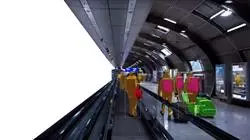University certificate
The world's largest artificial intelligence faculty”
Introduction to the Program
You will delve into Adversarial Networks to generate the most realistic data thanks to this 100% online university degree”

Computer Vision is a field of Machine Learning of great importance to most technology companies. This technology allows both computers and systems to extract meaningful information from digital images, videos and even other visual inputs. Among its many benefits is the increase in the level of precision during manufacturing processes and the elimination of human error. Therefore, these instruments guarantee the highest quality of products while facilitating the resolution of problems during production.
In view of this reality, TECH is developing a Master's Degree that will address Computer Vision in detail. Designed by experts in the field, the curriculum will delve into 3D image processing. In this regard, the program will offer students the most advanced processing software to visualize the data. The syllabus will also focus on Deep Learning analysis, given its relevance in dealing with large and complex data sets. This will allow graduates to enrich their usual work procedures with state-of-the-art algorithms and models. In addition, the teaching materials will provide a wide range of Computer Vision techniques using different frameworks (among which Keras, Tensorflow v2 Pytorch).
As for the format of this university degree, it is based on a 100% online methodology. All that is required is that graduates have an electronic device with Internet access (such as a computer, cell phone or tablet) to access the Virtual Campus. There they will find a library full of multimedia resources with which they will strengthen their knowledge in a dynamic way. It should be noted that TECH employs the innovative Relearningmethodology in all its programs, which will allow students to assimilate knowledge in a natural way, reinforced with audiovisual resources to ensure that it lasts in memory and over time.
You will specialize in a key area of future technology that will immediately advance your career”
This Master's Degree in Computer Vision contains the most complete and up-to-date program on the market. The most important features include:
- The development of case studies presented by experts in computer science and computer vision
- The graphic, schematic, and practical contents with which they are created, provide scientific and practical information on the disciplines that are essential for professional practice
- Practical exercises where the self-assessment process can be carried out to improve learning
- Its special emphasis on innovative methodologies
- Theoretical lessons, questions to the expert, debate forums on controversial topics, and individual reflection assignments
- Content that is accessible from any fixed or portable device with an Internet connection
Looking to specialize in Evaluation Metrics? Achieve it with this program in just 12 months"
The program’s teaching staff includes professionals from the sector who contribute their work experience to this educational program, as well as renowned specialists from leading societies and prestigious universities.
The multimedia content, developed with the latest educational technology, will provide the professional with situated and contextual learning, i.e., a simulated environment that will provide immersive education programmed to learn in real situations.
This program is designed around Problem-Based Learning, whereby the professional must try to solve the different professional practice situations that arise during the academic year For this purpose, the students will be assisted by an innovative interactive video system created by renowned and experienced experts.
You will effectively handle Deep Learning to solve the most complex problems"

You will have access to a learning system based on repetition, with natural and progressive teaching throughout the entire syllabus"
Why study at TECH?
TECH is the world’s largest online university. With an impressive catalog of more than 14,000 university programs available in 11 languages, it is positioned as a leader in employability, with a 99% job placement rate. In addition, it relies on an enormous faculty of more than 6,000 professors of the highest international renown.

Study at the world's largest online university and guarantee your professional success. The future starts at TECH”
The world’s best online university according to FORBES
The prestigious Forbes magazine, specialized in business and finance, has highlighted TECH as “the world's best online university” This is what they have recently stated in an article in their digital edition in which they echo the success story of this institution, “thanks to the academic offer it provides, the selection of its teaching staff, and an innovative learning method aimed at educating the professionals of the future”
A revolutionary study method, a cutting-edge faculty and a practical focus: the key to TECH's success.
The most complete study plans on the university scene
TECH offers the most complete study plans on the university scene, with syllabuses that cover fundamental concepts and, at the same time, the main scientific advances in their specific scientific areas. In addition, these programs are continuously being updated to guarantee students the academic vanguard and the most in-demand professional skills. In this way, the university's qualifications provide its graduates with a significant advantage to propel their careers to success.
TECH offers the most comprehensive and intensive study plans on the current university scene.
A world-class teaching staff
TECH's teaching staff is made up of more than 6,000 professors with the highest international recognition. Professors, researchers and top executives of multinational companies, including Isaiah Covington, performance coach of the Boston Celtics; Magda Romanska, principal investigator at Harvard MetaLAB; Ignacio Wistumba, chairman of the department of translational molecular pathology at MD Anderson Cancer Center; and D.W. Pine, creative director of TIME magazine, among others.
Internationally renowned experts, specialized in different branches of Health, Technology, Communication and Business, form part of the TECH faculty.
A unique learning method
TECH is the first university to use Relearning in all its programs. It is the best online learning methodology, accredited with international teaching quality certifications, provided by prestigious educational agencies. In addition, this disruptive educational model is complemented with the “Case Method”, thereby setting up a unique online teaching strategy. Innovative teaching resources are also implemented, including detailed videos, infographics and interactive summaries.
TECH combines Relearning and the Case Method in all its university programs to guarantee excellent theoretical and practical learning, studying whenever and wherever you want.
The world's largest online university
TECH is the world’s largest online university. We are the largest educational institution, with the best and widest online educational catalog, one hundred percent online and covering the vast majority of areas of knowledge. We offer a large selection of our own degrees and accredited online undergraduate and postgraduate degrees. In total, more than 14,000 university degrees, in eleven different languages, make us the largest educational largest in the world.
TECH has the world's most extensive catalog of academic and official programs, available in more than 11 languages.
Google Premier Partner
The American technology giant has awarded TECH the Google Google Premier Partner badge. This award, which is only available to 3% of the world's companies, highlights the efficient, flexible and tailored experience that this university provides to students. The recognition as a Google Premier Partner not only accredits the maximum rigor, performance and investment in TECH's digital infrastructures, but also places this university as one of the world's leading technology companies.
Google has positioned TECH in the top 3% of the world's most important technology companies by awarding it its Google Premier Partner badge.
The official online university of the NBA
TECH is the official online university of the NBA. Thanks to our agreement with the biggest league in basketball, we offer our students exclusive university programs, as well as a wide variety of educational resources focused on the business of the league and other areas of the sports industry. Each program is made up of a uniquely designed syllabus and features exceptional guest hosts: professionals with a distinguished sports background who will offer their expertise on the most relevant topics.
TECH has been selected by the NBA, the world's top basketball league, as its official online university.
The top-rated university by its students
Students have positioned TECH as the world's top-rated university on the main review websites, with a highest rating of 4.9 out of 5, obtained from more than 1,000 reviews. These results consolidate TECH as the benchmark university institution at an international level, reflecting the excellence and positive impact of its educational model.” reflecting the excellence and positive impact of its educational model.”
TECH is the world’s top-rated university by its students.
Leaders in employability
TECH has managed to become the leading university in employability. 99% of its students obtain jobs in the academic field they have studied, within one year of completing any of the university's programs. A similar number achieve immediate career enhancement. All this thanks to a study methodology that bases its effectiveness on the acquisition of practical skills, which are absolutely necessary for professional development.
99% of TECH graduates find a job within a year of completing their studies.
Master's Degree in Computer Vision
Welcome to TECH Global University's Master's Degree in Computer Vision, an exceptional postgraduate program designed for professionals looking to delve deeper into the fundamentals and practical applications of artificial intelligence and emerging technology. Our institution prides itself on offering a cutting-edge educational approach, with online classes taught by experts in the field of Computer Vision. This program is carefully designed to provide students with a thorough understanding of the theoretical concepts as well as the practical skills needed to excel in an increasingly technological work environment. Computer vision, as a discipline, triggers innovations in a variety of sectors, from healthcare to manufacturing to automation. This Master's Degree will immerse you in the key aspects of this discipline, addressing topics such as image processing, pattern recognition, and computer vision algorithm development. Through applied projects and real-world case studies, students have the opportunity to apply their knowledge in practical situations, preparing them for the challenges of the professional world.
Get qualified with the best in computer vision
At TECH Global University, we recognize the importance of flexibility in higher education. That's why our virtual campus allows students to access classes and study materials from anywhere, anytime. This flexibility ensures that working professionals can effectively balance their professional and educational responsibilities. Our distinguished faculty are experts in computer vision and technology, committed to guiding students on their educational journey. In addition, we encourage interaction and collaboration among students through virtual platforms, creating an online community that enriches the learning experience. Upon successful completion of the Master's Degree in Computer Vision, TECH Global University graduates will be prepared to lead in the practical application of artificial intelligence in a variety of sectors. Join us and raise your career to new heights by enrolling with us. Get ready to explore the infinite possibilities that artificial intelligence and technology have to offer.







